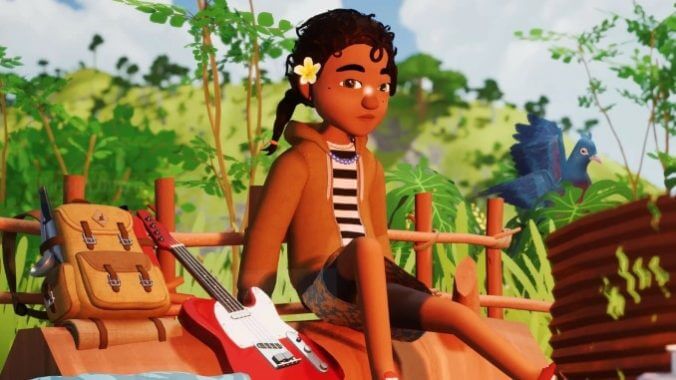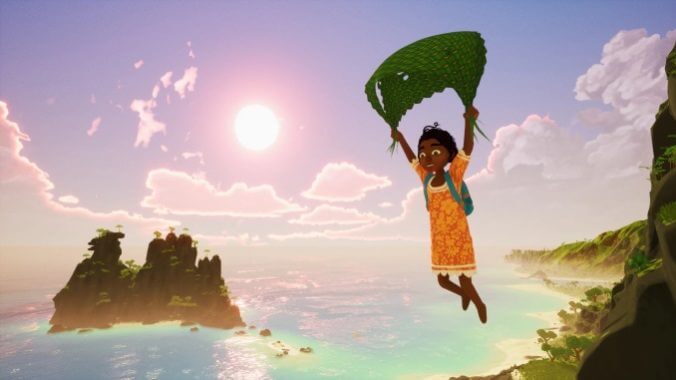If you’re making a game to introduce the culture of your small Melanesian country to the world, it makes sense to take inspiration from one of the most popular games ever made. That’s why Phil Crifo and Thierry Boura, the co-founders of the studio Awaceb, looked to The Legend of Zelda: Breath of the Wild when making Tchia, a new game heavily indebted to their home country, the Pacific archipelago of New Caledonia. It looks and feels like a 3D Zelda game, only it’s set in a fictionalized version of New Caledonia instead of the fantasy setting of Hyrule.
Playing Tchia should feel instantly familiar to Zelda fans. Our titular young heroine explores an archipelago of small islands by foot and sail, doing favors and gathering objects for the locals she meets during her travels. In a clear nod to Breath of the Wild, she has a stamina bar that depletes when she’s diving, climbing cliffs, or gliding down from great heights with the help of a giant green leaf. Tchia’s goal is to rescue a loved one, and that’s accomplished through exploration and collection—two things Link has been doing since the ‘80s. If you’re looking for a Zelda-style game to warm up for May’s release of Tears of the Kingdom, or just simply miss the sense of adventure that series is known for, Tchia is here to help.
Of course it does Tchia a disservice to discuss it solely in relation to the more popular game that influenced it. Tchia establishes its own identity through a few major mechanical diversions and, most notably, through its adaptation of the culture of New Caledonia.
Unlike Zelda, there’s not much traditional combat in Tchia, and what combat exists is probably the game’s weakest attribute. Tchia will occasionally come across encampments of enemies made out of cloth, but instead of whacking them with the business end of a breakable sword the goal is to light them on fire. She does that through the game’s main mechanic, “soul jumping,” which allows her to take control of animals and various objects found during her journeys. When it comes to fighting ambulatory fabric, that means possessing a lantern and then hurling it towards your enemies to light them on fire. You won’t have to do this nearly as often as Link has to bash some Moblin heads, but these fleeting moments don’t add much to the game.

Soul jumping isn’t just for burning up dickheaded cloth. Wildlife runs rampant across the game’s islands, and Tchia can hop into any animal she sees. If you’re bored of navigating rivers and oceans and would rather fly, she can zap into the body of a bird. If you want to get up that mountain in a jiff, look for a mountain goat. Tchia can also use the soul jumping gimmick to hurl herself great distances, which, when combined with the glider, can cover miles in a flash. When it comes to the game’s action, soul jumping is what most distinguishes Tchia from Breath of the Wild, ensuring that Awaceb’s game finds its own mechanical rhythm.
This is all secondary to what makes Tchia truly special, though: its depiction of the unique Melanesian culture of its developers’ homeland, one rarely seen in mainstream global entertainment. Tchia underscores the importance of New Caledonia’s traditions through the emphasis on the “coutume,” a customary greeting gift that drives much of the game’s collection. Tchia’s most vibrant moments come after you earn the trust of a village, which often leads to a post-dinner celebration with music and dancing. These elaborately choreographed and directed dance numbers double as rhythm mini-games, with Tchia playing along on a ukulele or various percussion instruments while you try to tap buttons according to the onscreen prompts. And although rural settlements are found throughout the game’s many islands, it also goes out of its way to show that small Oceanic countries like New Caledonia have developed urban centers filled with cars and tall buildings. Tchia doesn’t just want to share New Caledonia’s traditions, but flout whatever stereotypical expectations players from larger countries might have about the archipelago. You can file the unrealistic, sci-fi trappings of the story under that latter goal; instead of relying simply on mysticism and folklore for its more fantastical elements, Tchia mixes that up with a spot of sci-fi to subvert expectations. New Caledonia might be a small country in the middle of the Pacific, Awaceb seems to say, but that doesn’t mean it stories have to remain stuck in the past.
Tchia might be best enjoyed in small doses. It can be slow to move around, and an attempt at an in-game map that’s more realistic than other games is more of a hindrance than it’s worth. Finding your way around can be a little confusing and can take up more time than you might like. Still, it’s a refreshingly novel game that borrows just enough from Zelda to make it feel like a familiar old friend. Tchia and its version of New Caledonia are both worth exploring.
Senior editor Garrett Martin writes about videogames, comedy, travel, theme parks, music, wrestling, and anything else that gets in his way. He’s also on Twitter @grmartin.

